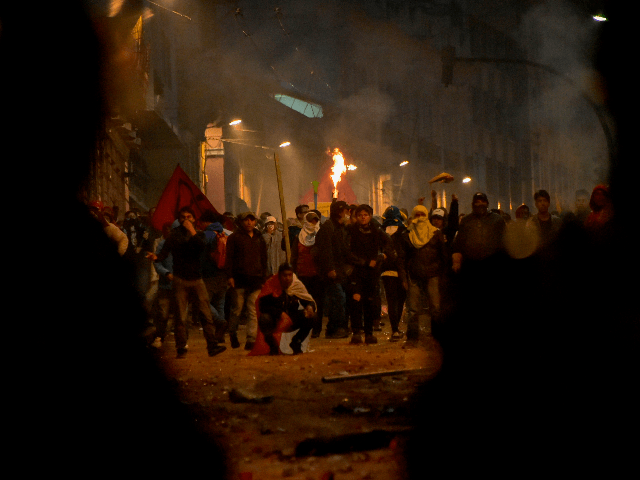An eruption of protests in Ecuador against socially conservative economic measures resulted in the death of an injured young protester Sunday after fellow participants in the outrage blocked his ambulance.
Indigenous organizations have organized nationwide protests and road blockades against President Lenín Moreno after the latter announced a package of reforms last week including an end to a decades-old government oil subsidy and Ecuador’s withdrawal from the Organization of Petroleum-Exporting Countries (OPEC), which allows Ecuador to raise oil output without limitations imposed by the international cartel.
Bus and taxi drivers organized the first protests against the end of the oil subsidy, which kept prices low by having the government pay for a percentage of the price of everyone’s gasoline. After Moreno imposed a 60-day state of emergency last week that legally dissolved freedom of association in the country, his government negotiated an end to the transport protests and their affiliated strikes. Moreno offered to meet with indigenous leaders for talks, but they refused, insisting instead on street violence.
The first death of the current wave of protests occurred in Azuay province, where protesters blocked the Cuenca-Molleturo-Naranjal highway. Ecuador’s El Comercio identified the victim as a “youth” named Raúl Chilpe who was participating in the protests when a black SUV ran him over. The driver, blocked from continuing in the direction of Guayaquil, their destination, by the protests, reportedly attempted to change directions and, in the process, ran Chilpe over.
Paramedics attempted to arrive on the scene but protesters refused to let their ambulance pass. El Comercio notes that at least one emergency medical officer waded through the crowd on foot to find Chilpe and offer first aid, but found Chilpe dead.
In addition to killing one of their own, the protesters have abducted 50 officers, the Ecuadorian newspaper noted, most of them soldiers sent out to impose the state of emergency and keep protesters from blocking roads. Indigenous leaders have denied mistreating the officers.
“They are accompanied by the community. They have not been treated violently,” Carlos Tagua, the president of the Indigenous Movement Confederation of Chimborazo, reportedly said.
Interior Minister María Paula Romo told reporters that police arrested 477 people in relation to the strikes on Sunday. Authorities have confirmed that many of the arrests are not related to violating the ban on public assemblies, but for rioting and looting businesses, which has become more common as the prices of basic goods increased as a result of the government stabilizing its spending.
Moreno responded to the protests in a video posted to his Twitter account Sunday announcing he was open to dialogue with the protesters to hear their concerns and, presumably, modify his policies if they propose good ideas.
“I am committed to dialogue with you, indigenous brothers, with whom we share many causes. Let’s talk about how to use the country’s resources for the neediest.” Moreno said. “Ecuadorian, do not lend yourself to be taken advantage of by those who seek chaos. Don’t share fake news. Help us denounce speculation. It is time to work, to turn the page on violence, it is an opportunity to confront the future with optimism. I am committed to changing the country – but I need you, Ecuadorian, to be committed, too.”
Estoy decidido a dialogar con los hermanos indígenas, con quienes compartimos causas. Hablemos sobre cómo usar los recursos para los más necesitados. ¡Estoy decidido a cambiar el país, pero necesito que tú también lo estés!#DecididosACrecer #EcuadorPaísDePaz pic.twitter.com/DdEcHCHy6N
— Lenín Moreno (@Lenin) October 7, 2019
In a separate video, Moreno condemned “Correistas” for “plundering the country … with public works that were good for nothing,” a reference to his predecessor, former President Rafael Correa, whose socialist government ushered in an era of expansive corruption that made China millions in cheap oil purchases and, some allege, tied Correa to the corrupt Brazilian contractor Odebrecht, whose bribes have resulted in the imprisonment of dozens of politicians in Brazil, Peru, Argentina, Colombia, and other states. Venezuela has not arrested anyone implicated in Odebrecht bribes because of Nicolás Maduro’s close ties to the company.
“I am committed to sanctioning those Correistas who have taken the people’s money away … those who stole the money used on works that were good for nothing,” Moreno said. “I am also always ready to speak, to lend my hand to decent people, to honest people who really want to change the country.”
Correa, a fugitive hiding in Belgium after a judge ordered his arrest for the abduction of an opposition politician, has backed the protests and posted promotional material for a large rally in Guayaquil, the economic center of the country, on Wednesday.
— Rafael Correa (@MashiRafael) October 7, 2019
Correa also referred to Moreno – who belongs to his political party and won the presidency largely due to Correa’s endorsement – as “the greatest scammer of our era” and his government as “the worst in history,” accusing police of “brutal repression” against protesters.
Indigenous leaders rejected Moreno’s call to talks.
“We have totally closed off dialogue with the government, there is no dialogue until we get to Quito,” Jaime Vargas, the head of the Confederation of Indigenous Nationalities of Ecuador, said on Sunday, referring to a massive protest scheduled for Wednesday in the Ecuadorian capital. “We are not here to negotiate behind the people’s backs. The people have risen and that has to be respected.”
Moreno’s reforms began with his withdrawal from OPEC, which in theory should lower gasoline prices if Ecuadorian oil production, no longer limited by the organization, skyrockets. Moreno’s government had exceeded oil output limits set by OPEC for years.
Moreno then announced that, as part of a deal for a large loan from the International Monetary Fund (IMF), he would end a 40-year-old government gasoline subsidy, triggering the transportation professionals’ revolt.

COMMENTS
Please let us know if you're having issues with commenting.